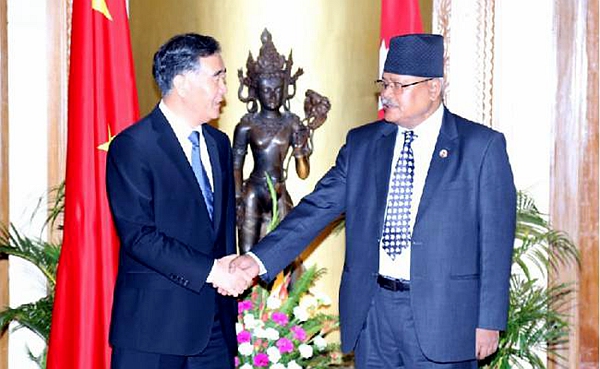Chinese VP visit gives momentum to China-Nepal ties
- By Ritu Raj Subedi
 0 Comment(s)
0 Comment(s) Print
Print E-mail China.org.cn, August 20, 2017
E-mail China.org.cn, August 20, 2017
|
|
|
China's Vice Premier Wang Yang (left), and Nepal’s Deputy Prime Minister Bijaya Kumar Gachhadar, shake hands during the signing ceremony of three important agreements in Kathmandu. |
China's Vice Premier Wang Yang wrapped up his 4-day visit to Nepal on a high note on Thursday. His visit encompasses a wide-range of bilateral issues but its diplomatic and political message remained loud and clear.
In his meeting with top Nepali leaders, the Chinese vice premier said he landed in Nepal with the message of President Xi Jinping: "China wants to take Nepal on the path of development. Both sides should be active in implementing past agreements. China wants peace and stability in Nepal to boost cooperation and investment."
Wang diplomatically nudged Nepal to implement the landmark agreements, including trade and transit treaties reached with China during the premiership of KP Sharma Oli in 2015. Nepal is already a member of the Belt and Road Initiative, a flagship project of President Xi, and Wang said Nepal should be proactive in order to reap the benefits availed by the BRI.
With the signing of BRI, Nepalese have dreamed of travelling in an electric railway which winds through Kerung to Kathmandu and then Pokhara to Lumbini. And the Chinese Vice Premier committed to realizing this dream. China plans to complete the railway track from Shigatse to Kerung near Nepal-China border by 2020, yet the two sides must carry out further groundwork to ensure its fruition.
Nepal and China signed three important agreements related to economic and technical cooperation, promotion of investment and economic cooperation, and oil and gas resource exploration. As per the first deal, China agreed to provide 1 billion RMB and technical cooperation for the reconstruction of Kodari Highway. It also includes the establishment of hydro power projects and transmission lines for connectivity.
The Framework Agreement on Promotion of Investment and Economic Cooperation seeks to bring in investment from the Chinese private sector for the infrastructure development such as road, tunnels and electricity transmission lines. Under the China-Aid Oil and Gas Resources Survey Project, China announced a grant to conduct a feasibility study on natural gas and petroleum products in mountainous, hilly and the plains of Tarai, including its survey and excavation.
The exploration of PoL products carries great significance as Nepal has constantly been roiled by shortages as well as blockades of fuel from its southern neighbor. In a friendly gesture, Wang announced 1 million U.S. dollar for the victims of natural calamities in Nepal.
Wang strove to increase political rapprochement with Nepal's two biggest communist parties, CPN-UML and CPN-Maoist Centre, which replaced the previous government of Oli. Sher Bahadur Deuba, who led a coalition government with the support of the Maoist Centre, is considered to have tilted towards India and the West. And Wang seemingly tried to neutralize Deuba-Prachanda's flirtation with New Delhi.
Many believe Wang's visit has set the tone for Deuba's visit to China. He is set to fly to New Delhi on August 23 and then he will go to China.
"Wang's visit has set a positive tone for Deuba's visit to China. It can be expected that Nepal and China will ink another vital accord on the railway operation here during his visit," said Hiranya Lal Shrestha, a foreign policy expert.
Shrestha said that if Deuba gains the confidence of the Chinese leadership by showing his diplomatic dexterity, President Xi might visit Nepal during the former's tenure. And Xi's visit will set a milestone in taking Sino-Nepal relations to newer heights.
One of the missions of Wang's visit was to keep Nepal neutral on the Doklam standoff. And he is satisfied with Nepal's non-aligned position and One-China Policy. India has been trying to bring Nepal within its foreign policy ambit despite Nepal's official stance of not siding with any neighbor over the geopolitical impasse.
Many fear Deuba can be suckered into inserting the Doklam issue in the joint statement between Nepal and India but Wang's fresh visit can be a strong reminder that Nepal can't afford to support one or another neighbor on this tradeoff that arose largely owing to India's arrogant posture.
Before Wang set foot in Nepal, Indian External Affairs Sushma Swaraj had just left Kathmandu. During her stay, she poked her nose into the internal affairs of Nepal. She suggested that the coalition government and the Rastriya Janata Party-Nepal should agree to put the constitution amendment bill to a vote in the parliament, and Madhesi parties should join the election by accepting the results of voting. Swaraj also praised the Deuba-Prachanda alliance, stating that it is essential for Nepal's democracy.
Quite the contrary, the Chinese Vice Premier refrained from commenting on domestic political issues. Instead, he focused on development, peace, prosperity and stability in Nepal. Because of China's clean and non-interference policy, a larger section of Nepali populace has stood for the increased relations, cooperation and connectivity between Nepal and China.
Ritu Raj Subedi is an associate editor of The Rising Nepal.
Opinion articles reflect the views of their authors, not necessarily those of China.org.cn.







Go to Forum >>0 Comment(s)